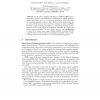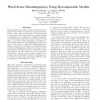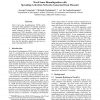111 search results - page 9 / 23 » A Concept-based Adaptive Approach to Word Sense Disambiguati... |
CLEF
2008
Springer
13 years 9 months ago
2008
Springer
Abstract. This paper describes our approach to the Question Answering - Word Sense Disambiguation task. This task consists in carrying out Question Answering over a disambiguated d...
CORR
2000
Springer
13 years 7 months ago
2000
Springer
In this paper Schapire and Singer's AdaBoost.MH boosting algorithm is applied to the Word Sense Disambiguation (WSD) problem. Initial experiments on a set of 15 selected polys...
ACL
1994
13 years 9 months ago
1994
Most probabilistic classi ers used for word-sense disambiguationhave either been based on onlyone contextual feature or have used a model that is simply assumed to characterize th...
ACL
2006
13 years 9 months ago
2006
This paper presents a new approach based on Equivalent Pseudowords (EPs) to tackle Word Sense Disambiguation (WSD) in Chinese language. EPs are particular artificial ambiguous wor...
IJCAI
2007
13 years 9 months ago
2007
Most word sense disambiguation (WSD) methods require large quantities of manually annotated training data and/or do not exploit fully the semantic relations of thesauri. We propos...



